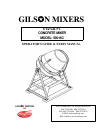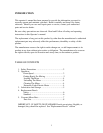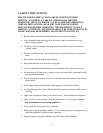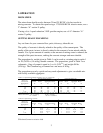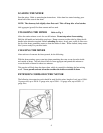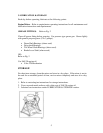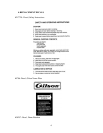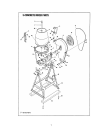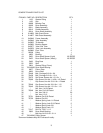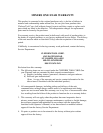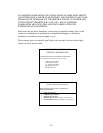
3
2-OPERATION
DRUM SPEED
The mixer drum should revolve between 20 and 25 R.P.M.’s for best results in
mixing concrete. To obtain this speed using a 1725/1800 R.P.M. electric motor, use a
2” diameter “A” section V-pulley.
If using a 6 to 1 speed reduction 3 H.P. gasoline engine, use a 6 ¼” diameter “A”
section V-pulley.
GETTING READY FOR MIXING
Lay out forms for your concrete floor, patio, driveway, sidewalk, etc.
The quality of concrete is directly related to the quality of the cement paste. The
quality of the paste, in turn, is directly related to the amount of water mixed with the
cement. For a given amount of cement, as the amount of mixing water is reduced, the
strength of the paste increases, making the concrete stronger and more durable.
The proportions by weight given in Table 1 can be used as a starting point to make 1
cu. Ft. (0.028
m3
) of strong, durable concrete. The proportions given in Table 2 are
volumetric; 1 bag of cement is equal to 1 cu. ft. (0.28
m3
) and weighs 94 lbs.
(42.6 kg). The Canadian bag of cement has a net mass of 40 kg.
The proportions are only a guide and may need adjustments to give a workable mix
with locally available aggregates.
Table 1. Proportions by Weight to Make 1 Cu. Ft. of Concrete
Air-entrained concrete Concrete without air
Course Course
Cement Sand aggregate Water Cement Sand aggregate Water
lb
lb lb lb lb lb lb lb
29 53 46 10 29 59 46 11
27 46 55 10 27 53 55 11
25 42 65 10 25 47 65 10
24 39 70 9 24 45 70 10
23 38 75 9 23 43 75 9
*If crushed stone is used, decrease coarse aggregate by 3 lbs and increase sand by 3 lbs.
Metric conversion: 1 lb = 0.121 kg 10 lbs = 4.54 kg
1 in. = 25mm
1 Cu. Ft. = 0.028 m
3
Table 2. Proportions by Volume*
Air-entrained concrete Concrete without air
Course Course
Cement Sand aggregate Water Cement Sand aggregate Water
lb lb lb lb lb lb lb lb
1 2 1/4 1 1/2 1/2 1 2 1/2 1 1/2 1/2
1 2 1/4 2 1/2 1 2 1/2 2 1/2
1 2 1/4 2 1/2 1/2 1 2 1/2 2 1/2 1/2
1 2 1/4 2 3/4 1/2 1 2 1/2 2 3/4 1/2
1 2 1/4 3 1/2 1 2 1/2 3 1/2
*The combined volume is approximately 2/3 of the sum of the original bulk volumes.
Maximum-
size course
aggregate in.
1 1/2
3/8
1/2
3/4
1
1 1/2
Maximum-
size course
aggregate in.
3/8
1/2
3/4
1
Portland Cement Association 1980



